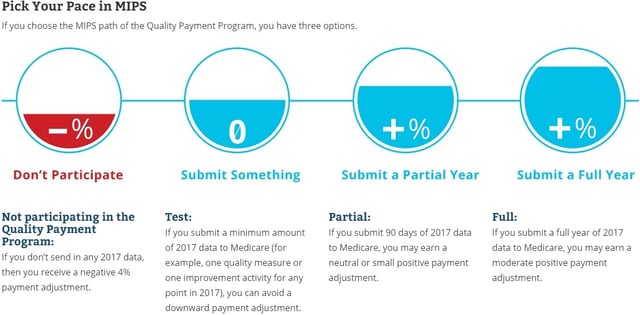 Posted by Dr. Becker on Oct 18, 2016 3:53:19 PM
Posted by Dr. Becker on Oct 18, 2016 3:53:19 PM

The Medicare Access and CHIP Reauthorization Act (MACRA) is a landmark legislation that alters how Medicare reimburses physicians. The ultimate goal of MACRA is to navigate away from the traditional fee-for-a-service model, to a quality-based reimbursement model.
The initial rule, proposed in 2015, was met with criticism from much of the medical community for its stringent requirements and hasty preparation period. However, the final ruling, released October 14, 2016, has expanded flexibility and exemptions.
Here are the updates to know:
1. Increased Reporting Flexibility in the First Year
Instead of provider’s reporting a full year’s data starting January 1, 2017, as initially proposed, CMS has adjusted reporting duration requirements to allow for more flexibility.
Providers that are ready can start collecting performance data on January 1, 2017, while others can begin anytime between January 1 and and October 2, 2017. Regardless of your start date, performance data will need to be submitted to CMS by March 31, 2018.
Data collected in the 2017 calendar year will be reflected in 2019 payment adjustments.
How does reporting flexibility affect MIPS reimbursements?
- No participation: If you do not send in any performance data from 2017, you will receive an automatic 4 percent negative payment adjustment.
- Submit Something: If you submit a minimum amount of data --i.e. one quality measure or one improvement activity--you will receive a neutral payment adjustment.
- Submission of a Partial Year: If you submit 90 days of data to Medicare you may earn a neutral or small positive payment adjustment.
- Full Participation: If you submit a full year of data, you have the potential to earn a moderate positive payment adjustment.

2. Adjustment to the Low-Volume Threshold for Small Practices
Due to concerns from small practices, CMS will exempt physician practices with less than $30,000 in Medicare charges or fewer than 100 unique Medicare patients per year.
This has increased the exemption threshold, which was originally set at $10,000 and is expected to exclude 30% of providers from MACRA participation.
3. Specialized Assistance for Rural and Small Practices
In the final rule, CMS details increased support for rural and small practices.
MACRA will be providing $100 million to fund training and education for Medicare clinicians in individual or small group practices of 15 clinicians or fewer and those working in underserved (rural) areas.
Additionally, CMS is giving small practices and individual providers the future option to report MIPS performance data in “virtual groups”, to ease administrative burden. Policies on virtual groups are expected to be elaborated on in subsequent updates to MACRA.
4. Simplified EHR Requirements

CMS has decided to do away with “Meaningful-Use” and the all-or-nothing approach to rewarding providers for EHR adoption.
Physicians will still be accountable for using health information technology under the "advancing care information" MIPS performance category, as was proposed initially. However, the final rule reduces the number of required reporting measures to five from eleven in the proposed rule.
Eliminating "all-or-nothing" requirements is beneficial for less-advanced practices who are just beginning to transition to health IT, but also rewards more-advanced practices for advanced adoption with the potential for higher payment adjustments.
5. Expanded Opportunities to Participate in APMs
CMS intends to broaden opportunities for providers to participate in advanced alternative payment models (APMs). These providers would be exempt from MIPS and qualify for increased rates and reimbursements.
Anticipated APMs for 2017:
- Comprehensive End Stage Renal Disease Care Model (Two-Sided Risk Arrangements)
- Comprehensive Primary Care Plus (CPC+)
- Medicare Shared Savings Program Track 2
- Medicare Shared Savings Program Track 3
- Next Generation ACO Model
CMS says it is looking to create new APMS in subsequent years, to provide additional incentives for clinicians to provide high-quality and cost-efficient care.
Further Resources:
- Final Ruling
- Executive Summary of Final Rule
- Quality Payment Program Overview Fact Sheet
- Quality Payment Program Website
- Submit a Comment on the Final Rule to CMS
How do you feel about the finalized MACRA ruling?
Topics: MACRA